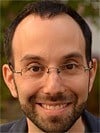This week’s Dvar Tzedek was originally published in 2010.
Parashat Behar-Bechukotai includes some of the Torah’s most haunting verses, in which God warns the people about the calamities that will result from failure to live a life centered on God and Torah. Among these, God warns:
I will set My face against you; you will be routed by your enemies and dominated by those who hate you; you shall flee though there is no pursuer of you (v’ein rodef etchem).[1]
This verse chills us with its terse depiction of physical violence accompanied by psychological terror. But the verse also contains an enigma: If we are being routed by our enemies, then how can it be that “there is no pursuer”? Aren’t our enemies pursuing us? Apparently, then, this pursuer must be something else entirely.
The early Rabbis noticed that the verse refers both to “your enemies” and “those who hate you,” and suggested a distinction: the enemies are external to us, while the haters are internal to the community, “drawn from among you and within you.” In the language of the midrash (no less chilling than the verse itself): “While your enemies surround you from outside, death will kill you from within.”[2]
This midrash does not explain the identity of the pursuer, but if the pursuer is not an external enemy, then perhaps, like the haters, it is internal. If so, then I want to suggest a different reading of our verse’s crucial phrase. Rather than “though there is no pursuer of you (v’ein rodef etchem),” it can be translated instead: “because there is no pursuer among you.”[3]
And who or what is this phantom pursuer? I suggest that it is not an internal enemy but an internal ally that is missing; not the rodef who pursues to kill,[4] but the rodef shalom, the pursuer of peace. In other words: we will flee before our enemies and be dominated by our haters, because among us, there is no one with the courage to be a rodef shalom.
The rodef shalom first appears in Hillel’s famous statement in Pirkei Avot: “Be among the disciples of Aaron—a lover of peace (ohev shalom) and a pursuer of peace (rodef shalom); a lover of all people, bringing them closer to the Torah.”[5] A few centuries later, another rabbinic text elaborates on Hillel’s words:
How to be a rodef shalom? The phrase teaches us that a person should be a pursuer of peace among people, between each and every one. If a person sits in his/her place and is silent, how can s/he pursue peace among people, between each and every one?! Rather, one should go out from one’s own place and go searching in the world and pursue peace among people.[6]
This forceful rabbinic teaching urges each of us to be a rodef shalom, to leave our homes and comfort zones and come face to face with others. We can hear the Rabbis’ indignant rebuke: Get off the couch! Stop reading news magazines about the world’s problems! Put yourself out there in the real world and interact with real human beings!
But what then? What is the shalom that we should pursue? This midrash doesn’t tell us that. True peace will look different in every context, and we are not called upon to go around imposing solutions on others. The midrash doesn’t even promise that we will find or achieve shalom. After all, Aaron is called ohev shalom and rodef shalom—a lover and pursuer of peace; but not oseh shalom—not a maker of peace.
Yet the midrash does teach us that in order to pursue shalom we need to look beyond ourselves. Shalom isn’t easy or simple. We don’t know enough about shalom to begin to make it, and merely plumbing our own souls will not reveal all that we need to know. We have so much to learn, and we often need to learn it from others.
Let this be a kavannah for those of us fortunate to travel to developing countries, particularly if we aim to volunteer and “do good” there. Let us not expect to arrive and save the day by making peace. Instead, let us listen and learn from others about what shalom would look like for them and about how they themselves pursue it. As our parshah suggests, there are powerful forces in the world that are the enemies of peace—pursuing war, hate and suffering. Let us learn to be equally powerful, each and every one of us a rodef shalom.
[1] Leviticus 26:17.
[2] Torat Kohanim (Sifra) on Bechukotai, 2:4:5.
[3] My re-translation depends on a few factors. First, the word rodef can be a present-tense verb (thus, “none pursues”) or a noun (“there is no pursuer”). Second, the prefix “v” (the letter vav) can carry different meanings in context. Third, the word etchem (2nd person plural) can be the direct object of a preceding verb (“no one pursues you”) or a preposition (“with you” or “among you”).
[4] For the source of the halakhic notion of the rodef, one who pursues to kill or rape another person, see Mishnah Sanhedrin 8:7.
[5] Mishnah Avot 1:12.
[6] Avot d’Rabbi Natan, version A, ch. 12 (ca. 4th c. or later) This translation follows the text compiled by the Vilna Gaon. But many printed editions read “among Jews (yisrael)” instead of “among people (b’nei adam).”

